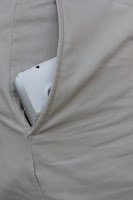How big can a phone be?
What is the right size for a
phone, what is the right size for a tablet?
Here are some easy facts
trying to give some thresholds in this fuzzy world. Sorry if you find it too
obvious, but when you look at the market, it doesn't seem so...
 |
| Which one is the iPad? |
1. The one-hand test
For me, a phone should fit in
one hand, and should be possible to use with one hand, the other carrying you
bag, or doing whatever you want, until it is legal ;-)
So, what does it mean?
I have a "regular" hand, so I think my own experience is
relevant. Large hands can add a few millimetres to my conclusions
 |
| That's OK (Galaxy S2) |
The test is to be able to type
a phone number or a text with you thumb, without too many errors and keeping
comfortable. This probably leads to a width of 65 – 66 mm, considering current
screen frames (bezel).
The trick is that it depends also on the thickness of the phone. So a Samsung Galaxy S2 with 66.1 x 8.5 mm is comparable to a HTC Sensation with 65.4 x 11.3 mm while a HTC HD2 with 67 x 11 mm is too big.
This will evolve as frames will be thinner and thickness will reduce. This should allow 4,5”, maybe 4,7 or even 5” screens.
The trick is that it depends also on the thickness of the phone. So a Samsung Galaxy S2 with 66.1 x 8.5 mm is comparable to a HTC Sensation with 65.4 x 11.3 mm while a HTC HD2 with 67 x 11 mm is too big.
This will evolve as frames will be thinner and thickness will reduce. This should allow 4,5”, maybe 4,7 or even 5” screens.
 |
| OOH, it is too big (Galaxy Note) |
The other thing is the height: it
must allow your thumb to cross comfortably the screen, in order to be able to
reach the keys at the bottom as well as the notification bar on the top. This
becomes more and more a constraint as screens are wider with the evolution
towards qHD resolution. This is more subjective as the hand can move, but it
seems we have reached the limit.
According to these considerations, the new
Galaxy Note (5,3" screen) does not pass the test. I let you decide if it is enough to say it
is not a phone but a (small) tablet.
2. The pocket test
Then, what is the next
threshold?
 |
| The HTC Flyer in a trouser pocket |
 |
| The HTC Flyer in a jacket pocket |
The weight is also a constraint. My wallet weight 160g, which gives a
benchmark. The Flyer with 420g is heavy, and today only the Note is below 200g.
Well, when will be available a 7” at 250g with a stylus???
3. Typing without a support
 |
| HTC Flyer |
If you intent to use your tablet standing, you should
better not go over 7” also. There are two ways to use it: two thumbs typing or
having the tablet in one hand and typing / writing with the other. In both
cases 120/130 mm width is a good threshold, even if it is more flexible than
the former one.
But what is the interest to have a bigger screen?
Resolution is not really an issue: the Galaxy Note has
the same resolution (800 x 1280 pixels) than a Galaxy 7,7” or 10,1”, and more
pixels than an iPad 2 (768 x 1024 pixels). Sure the bigger is more comfortable,
but the Note is amazing for book reading.
4. The two hands keyboard
 |
| Galaxy 10,1" |
If you intend to use your tablet sitting, like a
laptop, you will be interested by the possibility to type with two hands, as on
a normal qwerty keyboard. Maybe you don’t believe it is convenient, in fact it
is astonishing. You can really take notes during a meeting… For that, you need 190 mm to be comfortable, which corresponds for example to the Samsung 8,9”
screen or the iPad.
So, is 9” the perfect size?
 On one hand, I believe that a 8,5 / 9” in 16/9 format
could fit in near future both above criteria: 120 mm overall width to fit in a pocket and 190
mm screen length to allow two hands typing.
On one hand, I believe that a 8,5 / 9” in 16/9 format
could fit in near future both above criteria: 120 mm overall width to fit in a pocket and 190
mm screen length to allow two hands typing.
On the other hand, there is no limit until a school
bag size, which should allow 11 / 12” size, beginning to be really comfortable. My paper notebook weights 560 g which is exactly the 10,1" Tab right, while being much bigger, and remaining really acceptable...
Here is a view to summarise. Light green corresponds
to current possibilities, dark one to next future.
As always everything depends on the way you intend to
use your phone/ tablet, but in any case you need to keep in mind that
resolution is as important as screen size, while physical size will determine
the way your mobility is impacted.
Nota: all figures comes from the very good GSM Arena
site

I just love such dilemmas:
ReplyDelete- A factually continuous world
- But very strict device categories
I was trying to find benchmark in other industries. Conclusion seems to be "overlapping". Don't you think so ?